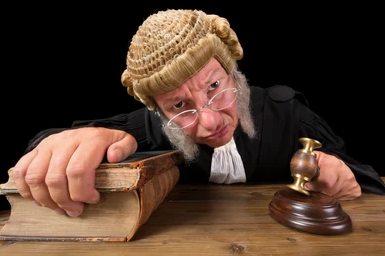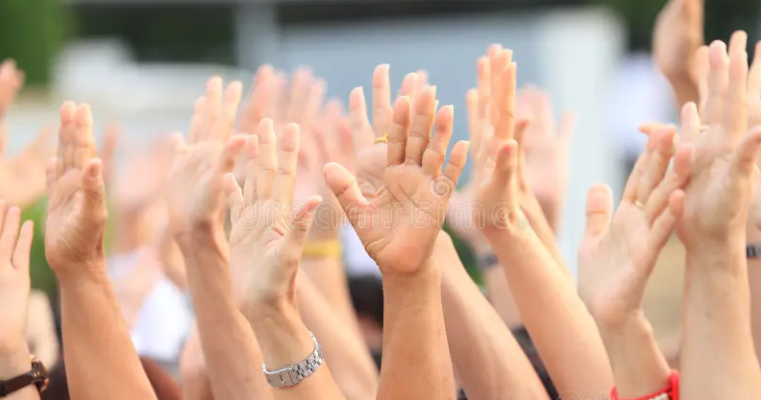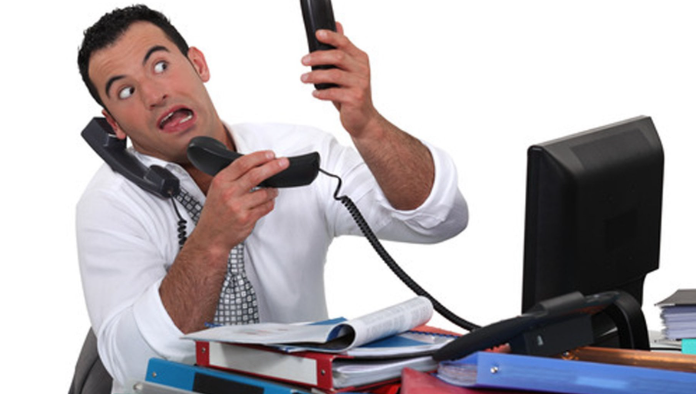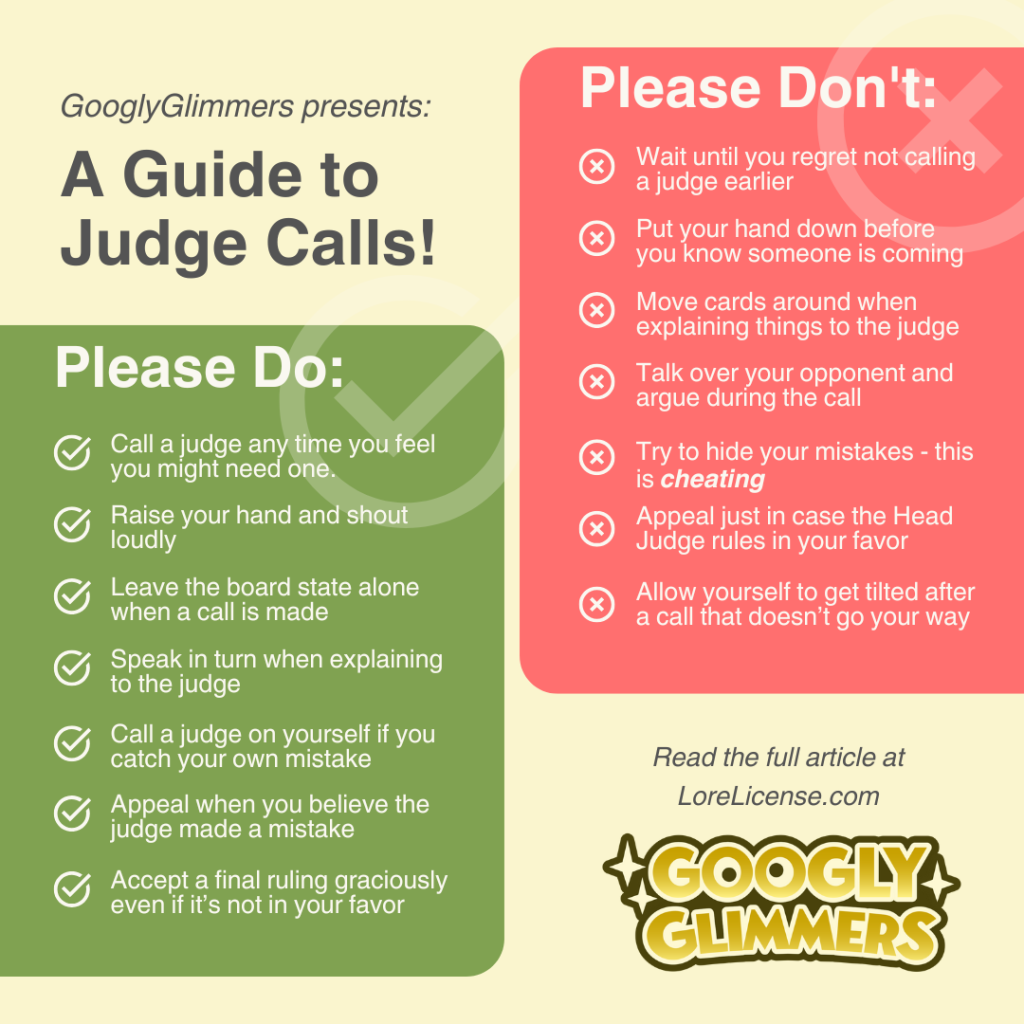…and you want to know what to expect if you need to call a judge. Or when to call a judge. Or how to call a judge. Well, you’re in luck, because I’m here to break down the whole procedure so you know what to expect. And, if necessary, what to do if the call doesn’t meet those expectations.

What Are Judges For?
It’s a common misconception among players who are less experienced at larger events to believe that judges are at events to catch cheaters, and that any need to interact with one means that something has gone wrong. It’s an unfortunate belief that any need to interact with a judge is a Bad Thing. But that could not be farther from the truth!
A judge’s number one goal at an event is to ensure that as many players as possible have the best experience possible. That means dealing with things like assigning fixed seating for players in need of that accommodation; making sure players without a cellphone can find their seats and report results; contacting custodial staff to make sure a spill is cleaned up – in other words, basic customer service.
The actual wielding of the rulebook is a surprisingly small part of dealing with players at an event, and even then it’s rarely an adversarial situation. Most rules questions are quick clarifications about a board state and don’t involve much of a dispute beyond that.
When Should You Call a Judge?
With all that in mind, the answer to this question becomes exceedingly simple: whenever you feel like it might help!
You don’t need to worry about whether or not you need a judge to be involved in a situation – that’s their whole job. Trust me, they would much rather be called over for a quick question than hear afterwards that someone had a bad time because they didn’t call for a judge. This goes for spectators too, by the way. Any spectator of a match is entitled to ask the players to pause play while a judge is called.
Here are just a few reasons why you might need a judge:
- You have to pee. No, really. We’ll give you extra time.
- You notice that a card is missing from your deck.
- Your opponent is playing so fast that you’re not sure what’s happening.
- There’s a facedown card in the middle of the table and no one knows why.
- You can’t remember how to resolve a particular set of abilities.
- You’re being made to feel uncomfortable by someone around you.
- You put your hand facedown into your inkwell. Again. Come on, now.

How Do You Call a Judge?
This is an easy one too. Raise your hand and shout the word “JUDGE!”. Be genuinely loud. Keep your hand raised until you see a judge make eye contact with you and head your way. Bear in mind that, like exits on an airplane, the nearest judge may be behind you.
It is generally sensible to let your opponent know that you’re going to call a judge before doing so, just so they can pause their play if it’s their turn and not be jump-scared when you yell at the top of your lungs. You do not need to tell your opponent the reason for the call if you’re not comfortable doing so, and you do not need permission from your opponent to make the call either. Do not let your opponent talk you out of calling a judge – it is always better to involve a tournament official when an issue with a game arises.
Here are some quick ideas for how to let your opponent know you’d like to call a judge without being confrontational or accusatory (even if it kinda is…):
- “Hey, I’m not sure how this interaction works. I’m gonna call a judge so we can make sure we get it right.”
- “Hold on a sec, I think we’ve messed up somewhere. Let’s call a judge to get it sorted.”
- “I think I saw this on Discord, but I can’t remember what they said. I’ll call a judge so they can tell us how it’s supposed to go.”
- “Hey, I need a judge to help me with something real quick. Can you hold on while I call one over?”
- “Oh snap, I forgot to [resolve a trigger, draw a card, eat an Uncrustable]. We’d better call a judge to see if I can do that now.”
Wait, I Can Call a Judge on Myself?
Yes! In fact, you have to if you’re the one who notices that you’ve made a mistake. Again, you can let your opponent know what happened before calling for a judge if you want to, but being the one to make the call yourself is the best way to help the judge assess the situation correctly. If an investigation is required, having called the judge on yourself is a big clue that you didn’t try to cheat.
On the other hand, deciding not to call a judge on yourself and hoping your mistake flies under your opponent’s radar is actually cheating – by concealing your error, you would have upgraded your own penalty. Don’t do that!
What If It’s Something Really Minor?
Call a judge anyway. While it is my belief that the majority of simple, minor errors are genuine mistakes, it is still important to track them over the course of an event. Forgetting to place a damage counter on your Mr. Smee – Bumbling Mate once isn’t a big deal. Maybe even twice. But if it happens every round then a very different picture starts to emerge. Judges can only address this sort of low-level issue if we are made aware of it consistently. You may feel embarrassed calling a judge over something so small, but you shouldn’t let that get in the way of dealing with it correctly. The staff will appreciate it!
Can I Ask How Something Works Before I Do It?
You can, although you may not always get the answer you expect. All judges should be very wary of straying anywhere close to an answer that may appear to be “play advice” (telling a player what to do on their turn, or saying whether a particular play is a good idea). This leads some judges to avoid answering hypothetical questions entirely, but many will answer with the rules that cover the interaction you are asking about and leave it up to you to apply it to your specific situation.
For example, at the most recent CCS event, I was asked by a newer player whether or not their Baymax – Giant Robot could sing the turn he was Shifted. Instead of answering with “Yes, if you Shift him onto Donald Duck – Perfect Gentleman you can do that because Donald is already dry,”, I chose to tell them the general rules about Shift characters inheriting the dry/drying state from the character they shifted onto. It may seem like a silly thing to worry about, but it gives a lot of judges peace of mind over answering these sorts of questions without having their integrity questioned in turn.

What Happens During a Call?
Exactly how a judge call proceeds depends a lot on the size of the event and the experience of the judge taking the call. There are some basic things you should expect to see every time, though.
First of all, the judge will ask the players what the call is about, usually defaulting to the player who made the call itself first. If both players have input, then the judge will listen to both of them in turn. If you have something to discuss with the judge that you do not wish the opponent to hear, you can always ask to speak to them away from the table. If necessary, the judge will often repeat back to the players what they have understood about the situation and get the players to confirm or clarify, to make sure everyone is on the same page.
Next, the judge may investigate the call if needed. This can involve checking inkwell cards, discard pile contents, reconstructing turns, and talking to players. The judge may ask you questions away from the table if they need information that your opponent should not hear. How long this takes depends entirely on the complexity of the issue, but you should always expect some investigation if the call requires it.
Finally, the judge will make their ruling and perform the remedy, including assigning any corrective actions (warnings, game losses, etc) where needed, and correcting the game state where appropriate. This is also the point where you have the right to appeal the judge’s ruling. Unless an appeal prolongs the call, you will receive a time extension for your match, and resume play.
What are Appeals?
The ruling of any floor judge can be appealed to a Head Judge, or other supervisory judge (the exact nature of who hears appeals depends on the size and structure of the event, and isn’t super important). You should appeal a ruling if you genuinely believe the responding judge made an error. It is not an extra opportunity to roll the dice on a favorable ruling.
That said, any call can be appealed. The Head Judge will talk to the original judge first, to hear their understanding of the situation and rationale behind the original warning, before then talking to the players. Additional investigation by the Head Judge may occur, again depending on the complexity of the call, and then they will issue their final ruling. There is no appeal following the Head Judge.
Note: some smaller events may only have a single judge. You may be able to appeal to the tournament organizer at these events, but they are often unlikely to overturn their judge’s ruling.
What If I Still Don’t Agree With the Ruling?
Unfortunately, judges are not infallible. Even the most experienced Head Judge will occasionally be unable to investigate a situation to the point of certainty about the truth, and will be forced to make a judgement that is a “best fit”. Sometimes, this will not go in your favor, and you will have to deal with that disappointment with grace. The word of the Head Judge is final, even when you are absolutely certain that it is wrong.
The good news is that while an incorrect ruling may affect your current match, it is incredibly unlikely to affect your whole event. Lorcana’s play corrections are very forgiving, and if you can keep your game face on and play through the frustration there’s no reason to allow it to ruin your tournament.
Conclusion
If you read this far down, thank you! I hope you feel better prepared for making a judge call at your next event. Remember – it is your right to involve a judge in your game whenever you feel it is necessary, even if your opponent doesn’t agree. It is always better to call a judge in the moment than to let the moment pass and regret not taking action. We are there to help!
Quick Reference
